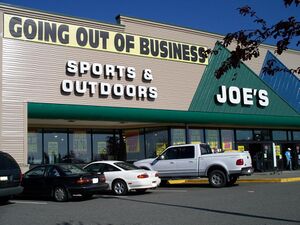Finance:Business failure


Business failure refers to a company ceasing operations following its inability to make a profit or to bring in enough revenue to cover its expenses. A profitable business can fail if it does not generate adequate cash flow to meet expenses.[1]
Reasons
Businesses can fail as a result of wars, recessions, high taxation, high interest rates, excessive regulations, poor management decisions, insufficient marketing, inability to compete with other similar businesses, or a lack of interest from the public in the business's offerings. Some businesses may choose to shut down prior to an expected failure. Others may continue to operate until they are forced out by a court order.
The Small Business Administration, in an article on small business failure,[2] lists additional reasons for failure from Michael Ames book on "Small Business Management":
- lack of experience
- Un-trusted sales representative
- insufficient capital
- poor inventory management
- over-investment in fixed assets
- business's finance mismanagement
- poor business location
- poor credit arrangement management
- unexpected growth
- engaging in the wrong business niche
- inability to recover from a major business interruption
A study published in 2014 by the Turnaround Management Society reveals that most crises are caused by the mistakes of top management. The most prominent causes of a crisis are that the management continued with a strategy that was no longer working for the company (54.6%), and that they lost touch with the market and their customers and did not want to adapt to changes occurring around them (51.6%). Having a clear strategy that is communicated well to all operational areas, one that uses and builds USPs, is desirable for every company but is often not the case. Incorrect strategic decisions (39.4%) are often made because of the lack of a clear strategy, and they can have a significant impact on a company’s financial position in the market. [4]
There are many opinions about the most important reason that businesses fail:
- Peter Drucker claimed the most important reason that businesses fail is because management didn't ask "what is our business?" in a "clear and sharp form."[5]
- Eric T. Wagner, who has 30 years experience as a serial entrepreneur, says that entrepreneurs fail when developing new products because they "retreat to a cave" instead of thoroughly understanding their customers needs. A survey of more than 1000 Australian SME business owners found that business failure was most likely because of an inability to manage costs.[6]
- Dr. Christoph Lymbersky analysed internal causes over a timeline of 38 years which shows that the lack of financial control is becoming less and less relevant as a crisis factor. In 1984 inadequate financial control still contributed to 75 percent of all corporate crises. In his 2014 survey, only 36 percent or restructuring consultants reported inadequate financial control to be a cause of decline. [7]
- According to a study by Industry Canada, "the main reason for (business) failure is inexperienced management. Managers of bankrupt firms do not have the experience, knowledge, or vision to run their businesses".[8]
- M. Victor Janulaitis surveyed 278 organization in 2018 on why disaster recovery and business continuity plans fail and found that after 12 months 51% of small to mid-sized business were not able to re-open their doors. [9]
After Closing
After, a business may be dissolved and have its assets redistributed after filing articles of dissolution. A business that operates multiple locations may continue to operate, but close some of its locations that are under-performing, or in the case of a manufacturer, cease production of some of its products that are not selling well. Some failing companies are purchased by a new owner who may be able to run the company better, and some are merged with another company that will then take over its operations. Some businesses save themselves through bankruptcy or bankruptcy protection, thereby allowing themselves to restructure. There are several consequences towards the owners/shareholders, such as limited liability, the finance and the continuity (if a shareholder does not want to continue in the business).
See also
References
- ↑ Cash Flow: The 10 Rules of Cash Flow 101
- ↑ What are the major reasons for small business failure?, U.S. Small Business Administration, http://www.sba.gov/content/what-are-major-reasons-small-business-failure, retrieved 2013-11-29
- ↑ Ames, Michael (1983), Small Business Management, West Group
- ↑ Why do Companies fail? 2014 Survey Results, Turnaround Management Society, 14 February 2014, http://turnaround-society.com/companies-fail-2014-survey-results/
- ↑ Krames, Jeffrey (2008), Inside Drucker's Brain, Portfolio - Penguin Books, p. 163, ISBN 978-1-59184-222-4
- ↑ Top reasons for small business failure: Study, Smart Company, 12 April 2013, http://www.smartcompany.com.au/growth/31229-top-reasons-for-small-business-failure-study.html
- ↑ Why do Companies fail? 2014 Survey Results, Turnaround Management Society, 14 February 2014, http://turnaround-society.com/companies-fail-2014-survey-results/
- ↑ Baldwin, John; Gray, Tara; Johnson, Joanne; Proctor, Jody; Rafiquzzaman, Mohammed; Sabourin, David (1997), Failing Concerns: Business Bankruptcy in Canada, Minister responsible for Statistics Canada, ISBN 0-660-171201, http://www.statcan.gc.ca/pub/61-525-x/61-525-x1997001-eng.pdf
- ↑ Why Recovery fails? 2018 Survey Results, Janco Associates, Inc., 7 February 2018, https://www.e-janco.com/WhyDRPsFail.htm/
External links
- http://smallbiztrends.com/2008/04/startup-failure-rates.html
- http://smallbiztrends.com/2008/05/how-do-entrepreneurs-come-up-with-new-business-ideas.html
- https://web.archive.org/web/20091217082204/http://www.thetimes100.co.uk/theory/theory--business-failure--320.php
- https://thecommhubblog.wordpress.com/2017/07/26/startup-failure-reasons/
- https://web.archive.org/web/20091120061711/http://www.sbaonline.sba.gov/
